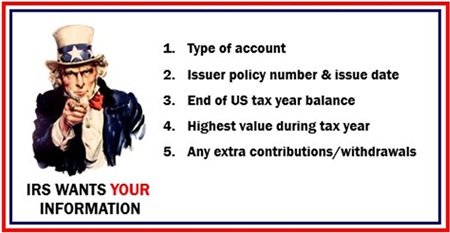It’s the fifth anniversary of the introduction of FATCA: a law requiring US citizens and the financial institutions they use – wherever they may be – to annually inform the US government of accounts. Just as its effects are becoming apparent and it’s proving to be a nightmare for some, there’s talk of the possibility the law may be repealed. As it stands, is it still beneficial for Americans to invest abroad?
It’s hard to believe that the already year-long campaign for the US presidency still has another seven-and-a-bit months to run before anyone is actually elected – and then nine months before the least unpopular candidate takes office. Judging by how these venerable candidates are knocking lumps out of people in their own party, it seems things are going to devolve even further.
One of the many battlefields of this most uncharitable of telethons is the fate of the Foreign Account Tax Compliance Act – or FATCA. The Republican National Committee wants to repeal the Act, whereas the Democrats (except some of those living overseas) wish to keep it. The merits of FATCA have been much discussed and debated; yet I think it has been little understood.
 MBMG Investment Advisory
MBMG Investment Advisory
In short, since the 2008-2009 global financial crisis, the US government has been looking under sofas and mattresses to fill its coffers, in the mistaken belief that balancing its accounts is more important than reducing private debt.1
Opening Pandora’s Box
As Americans are liable to pay US tax, regardless of where in the world they may be living, the government has found an ingenious way to haul in money: by getting banks and other financial institutions where American citizens hold accounts to provide information on income and assets in those accounts.
So if a US citizen is living in Thailand and has a bank account in that country, the Thai bank is required to provide the IRS with certain information (see chart). Yet any such system needs the co-operation of the thousands of non-US commercial banks and the countries in which they are based.
So why are they co-operating? One reason is that governments of the G20 countries have seen FATCA as a means to create an international system for exchanging information to make their own tax collection easier. To date, 96 countries have signed up to the OECD-drafted Common Reporting Standard (CRS). Although one major player in the global economy refuses to take part; the country which initiated the whole process: the United States.2
Having secured bilateral data-sharing agreements with many several different countries, it sees no need to join the CRS. Yet its record of surrendering information to those it has signed deals with is patchy. The accusation is that it fails to pass on account balances, doesn’t seek true beneficial owners in corporate structures and only shares information with the countries which meet a host of privacy and technical standards.3 Ironically, this could make the US a potential tax haven for non-Americans.4
Mirroring decades of US foreign policy
Having such bilateral agreements in place has enabled the American authorities to employ a clever, if not subtle, way of getting foreign banks and other financial institutions to comply. It amounts to an extension of Theodore Roosevelt’s “Speak softly and carry a big stick”5 policy.
That big stick is quite hefty.6 Financial institutions which don’t comply are subject to a 30% withholding tax on any of their own transactions in the US. If that already sounds stringent, it’s worth considering that this includes all transfers made in US Dollars – as such actions are covered through US-based banks and any USD transaction is reported in US Customs’ Currency and Monetary Instrument Reports (CMIR) – irrespective of whether either party is an American citizen or based in the US. And if you’re an American who gets involved or signs off in the financial transactions of your non-American company, you’re obliging them to report too – as happened with the CFO of one Swiss hospital.7
Not only that, a US person must still complete the forms under the FBAR system, which requires Americans to disclose the details of foreign bank current accounts they hold. Those Americans who have any other type of account, insurance policy, etc., are also compelled to declare these in an additional form, often known as Shadow FBAR.8
All this means that if financial institutions outside the US want to do business with Americans, they have to report to the IRS. The resource requirements needed for banks and other financial institutions to comply with FATCA have dissuaded many from offering services such as investment management, banking, insurance and mortgages. In some cases, banks and brokerage firms have restricted existing accounts. In fact, one poll found that one in six respondents reported having had financial accounts closed due to FATCA. Examples of this include cancelling mutual funds accounts and pension funds.
More acronyms
As if FATCA wasn’t bad enough, in December last year Congress passed the FAST act. This latest acronymic evil includes two tax provisions: one permitting the government to revoke or deny a passport to anyone who the IRS has earmarked as seriously delinquent. I can think of a few people in the Fed that would fit into that term; yet in the IRS context it means someone with an outstanding federal tax debt of over USD50,000, including interest and penalties. The other provision allows the government to revoke a passport for anyone who wilfully, intentionally, recklessly or negligently fails to provide a valid social security number. Passport applications can also be denied if the social security number given is incorrect or invalid.
The best way to avoid falling foul of FAST is to get professional help in completing a US tax return, to make sure everything is totally accurate. In completing passport applications, it’s wise to be extremely careful and double-check everything – no qualification has yet been applied to the term reckless, so it could have a broad scope.
Global implementation
Until recently, Americans could hold regular private banking, life and brokerage accounts in Thailand. This was because, although the Thai government had agreed in principle to exchanging information with the US, it hadn’t officially signed up.9 That changed in early March this year,10 however, so it is just a matter of time before FATCA is fully implemented in the Land of Smiles. As in 54 other countries – and nearly 60 more who are on the path to implementation11 – Americans need to carefully consider other solutions.
So life for American investors overseas is complicated right now. However, I find it not only unfair but also a dereliction of duty for financial institutions to merely abandon their US clients. It may be an old-fashioned view, but I still believe that the services that financial advisors, banks, fund managers and other financial professionals provide should be part of a long-term relationship with a client, not just for when it happens to be most convenient. As an advisor, I feel it’s my responsibility to help find ways for Americans living abroad to invest and save efficiently.
Fortunately, there are still FATCA compliant ways to invest and save efficiently. These range from simple brokerage accounts to various types of private placement structures for retirement planning, saving, investing and estate planning. Each of these needs careful attention to detail but can generally be established in a compliant cost-effective and tax efficient way by a fee-based advisor offering impartial access to the whole market.
At MBMG with our global reach, as part of the world’s 6th largest accounting, audit, tax and legal alliance, we can also arrange assistance with filings and returns to support your financial plans.
The best way to ensure you’re compliant, yet able to save efficiently, is to seek advice from a regulated independent advisor. MBMG Investment Advisory is committed to continue offering advice to US citizens, regardless of their residency status. So if you have any questions or concerns, we’d be glad to help using our own expertise and that of our contacts in the US.
Footnotes:
1 http://www.ideaeconomics.org/blog/2015/1/13/steve-keens-2015-outlook
2 http://www.economist.com/news/international/21693219 -having-launched-and-led-battle-against-offshore-tax-evasion-america-now-part
3 ibid
4 ibid
5 Theodore Roosevelt’s letter to Harry L. Sprague, 1900
6 Title 26 U.S. Code §1471
7 http://www.wsj.com/articles/the-law-that-makes-u-s-expats-toxic-1444330827
8 IRS Form 8938
9 https://www.treasury.gov/resource-center/tax-policy/treaties/Pages/FATCA.aspx
10 http://bangkok.usembassy.gov/news/press/2016/nrot009.html
11 US Treasury Department
| Please Note: While every effort has been made to ensure that the information contained herein is correct, MBMG Group cannot be held responsible for any errors that may occur. The views of the contributors may not necessarily reflect the house view of MBMG Group. Views and opinions expressed herein may change with market conditions and should not be used in isolation. MBMG Group is an advisory firm that assists expatriates and locals within the South East Asia Region with services ranging from Investment Advisory, Personal Advisory, Tax Advisory, Corporate Advisory, Insurance Services, Accounting & Auditing Services, Legal Services, Estate Planning and Property Solutions. For more information: Tel: +66 2665 2536; e-mail: [email protected]; Linkedin: MBMG Group; Twitter: @MBMGIntl; Facebook: /MBMGGroup |




